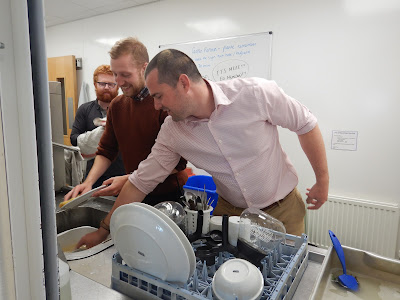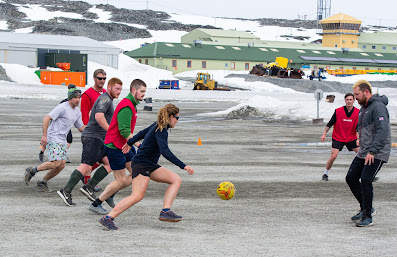Since writing my last post, a wonderfully active and intense summer season has ensued. Living on a research station with your colleagues is certainly a unique experience; the days are vibrant and there is always an activity going on. Contrary to what I thought life might be like in Antarctica, I seem to experience FOMO (fear of missing out) more than anything!
First, the most frequent activity of the day is, of course, meal times. This is a fantastic opportunity for all walks of station life to come together and share their daily experiences. I continue to be astonished by the array of food that the kitchen produces. Falafels, polenta, courgette, banana curry, luxury ciabatta sandwiches, pain au raisins and melon.... the flavours are constantly bursting and the food choice changes daily, we are certainly spoilt! At the peak of the summer season, there were roughly 110 people on base (depending on who was out in the field), with only three chefs who alternated between kitchen duties. I take my hat off to their incredible efforts and long hours. As part of living on station, certain tasks are rotated between everyone, for example, each day someone will spend the day helping in the kitchen, cleaning pots and washing crockery from meal times. Peeling potatoes, chopping celery and piping cream onto desserts is extremely fun whilst listening to a range music (it's a path to discovery!) Days like these certainly contribute to a strong sense of station bonding.
In February, the JRC came back to collect the outgoing wintering team and we were blessed with an influx of 'freshies' (fresh food and supplies) from the Falklands, adding some extra freshness and crunch to our meals. When quizzing the outgoing wintering team about what they had missed the most, it was almost always fresh ingredients, or their dog...
In addition to the standard three daily meals, there are two extra breaks (we call it smoko) at 10:30 and 16:00 where soups, eggs, rolls and cakes are served! It is quite common for people to put on weight whilst on station but when working outside in the cold for many hours, it's important to upkeep the calorie intake. Furthermore, joining together over a cup of tea, reading news updates and attempting the daily crosswords maintains a strong communal feeling throughout the base. Birthdays are often celebrated with a fancy cake that either the chefs make or non-chefs make if said person is feeling brave!
An evening meal prepared by Flo - a summer chef
The canteen area - vibrant and fresh salads in Antarctica!

The wonderful creation of pain aux raisins by chef Ollie (and fellow spectators)
Birthday cake making and questionable decorating...
Washing up duties with everyone chipping in
Saturday nights are generally more special and people make an effort to dress up, which can be quite a shock after seeing colleagues in orange boiler suits all day to suddenly transition into a smart shirt. The ironing board is often in maximal use on Saturday afternoons! Certain events have been celebrated on station such as Burns Night (25th January) which, I discovered, celebrates the life of a Scottish poet, Robert Burns. A large proportion of people on station are from Scotland and therefore many kilts made an appearance. After the Selkirk Grace, a traditional meal of Cullen Skink (smoked haddock soup), Haggis, IRN BRU floats, Cranachan (a raspberry, cream and oat dessert) and coffee, the tables were swiftly pushed aside and a Ceilidh ensued- a Scottish folk dance. Thankfully, the trained Scots women and men led this event and instructed many of us novices how to dance in time with our partners or groups, it is certainly a sociable activity with groups of up to eight people skipping around the hall. The evening continued with one particular dance called 'strip the willow' where all participants lined up on two sides of the hall and partners would swing between each person in the opposing line before re-joining their partner in the middle. If this wasn't complicated enough, multiple pairs were moving through the lines and confusion amongst many (bar those in kilts) quickly amounted!

Celebrating a Scottish tradition - burns night
Another reason for a party was setting up for our two-part Folk Night. All acts were submitted in advance of the event and performed on a makeshift stage, first in the boatshed and then in the garage. Acts ranged from solving a rubik's cube, to an instrumental performance using a vacuum cleaner, to poetry (specifically a series of Japanese Haikus performed by a field guide who had probably spent too long in a tent) to some excellent guitar pieces, singing duets and formidable bands.
Preparing the boat shed for folk night (making use of recycled material)
Folk night performances in the garage
When walking around station and moving between buildings, it is not uncommon to come across an elephant seal parked outside the door or blocking the walkway. These are quirks of station life that snap you back into reality because sometimes it is easy to forget that you are in Antarctica when tucking into a wonderfully tasty plate of food, watching a movie, or knitting (!) and going about 'normal' activities that you would do at home.
Coming across a slight obstruction on the way to work
Said elephant seal strategically soaking up the sun
Other times you could be mid task and suddenly a radio call erupts ' all stations, all stations, there are orca at the wharf.' If people are available, we generally make our way down to witness the spectacle of orca tracking through ice, hunting seals or spy hopping. Working at the south end of station in the Bonne Laboratory, meant that during one such event we could see a group of orca spy hopping from our laboratory window! And then everyone returns to work...
Watching orca off the wharf
Orca attempting to knock crabeater seals off an iceberg- view from the laboratory
photo credit: Ryan Mathews
Our first Folk Night celebration was in honour of the epic journey the JCR has undertaken in the past 5 months and making it possible to refuel and maintain the island and continental Antarctic stations with the looming uncertainty of the Covid crisis. For many on station, the ship was our home for eight weeks and after having disembarked in December, mooring it up in Rothera in late February was exciting (so were the crunchy apples). We were thrilled to be reunited with the crew and I smiled each morning seeing the JCR at the wharf. The JCR's captain, Graham, arranged a rendition of the Owl and the Pussy-Cat on stage during Folk Night with his crew..... a fantastic way to end the summer season. The JCR headed back North on 19th February with many of the old wintering team, scientific samples and an aquarium that will deliver live Antarctic species to Cambridge (find out more
here). As of this weekend, the JCR has ended it's Antarctic expeditions with the British Antarctic Survey and is being unloaded in Harwich.

The JCR departs from Rothera for the final time



















Wonderful wonderful !
ReplyDeleteSo lovely that you are following JY
Delete